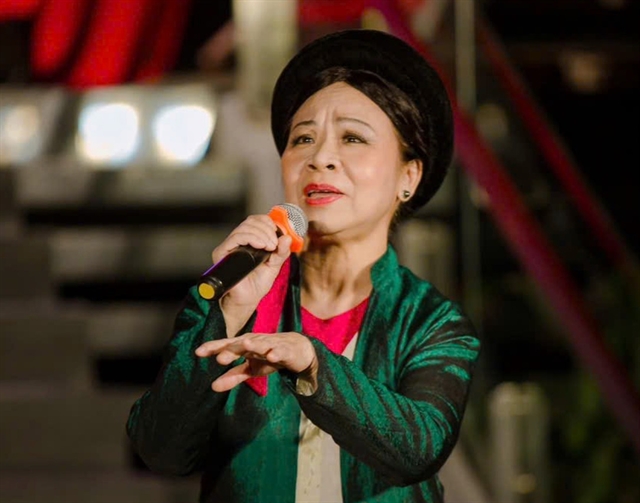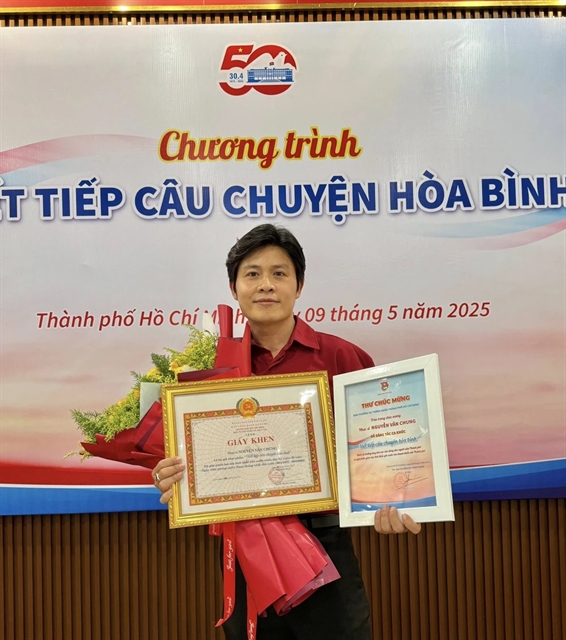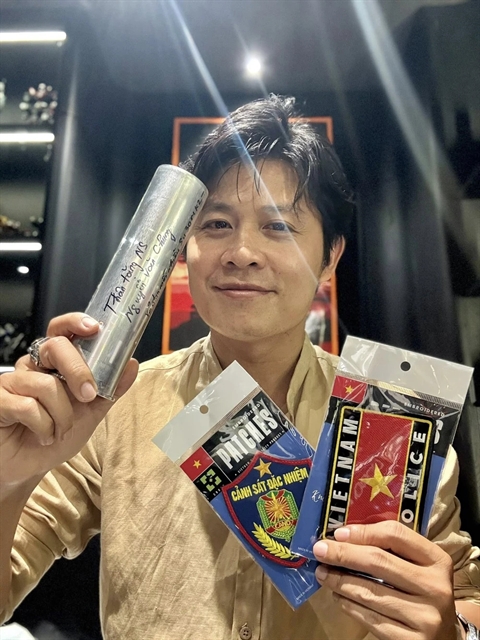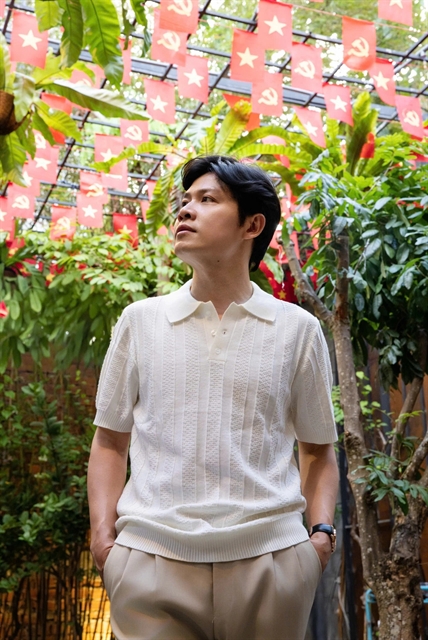 Inner Sanctum
Inner Sanctum

Nguyễn Văn Chung is a renowned Vietnamese songwriter, known for a wide range of heartfelt ballads. One of his latest works, Viết Tiếp Câu Chuyện Hòa Bình (Continue the Story of Peace), has taken the country by storm with over three billion plays across streaming platforms. But for Chung, music is no longer just a career – it's a calling. Kim Chi speaks to Chung for Inner Sanctum.
 |
| Nguyễn Văn Chung says 'Continue the Story of Peace' was inspired by heartfelt stories from war veterans. Photos from thethaovanhoa.vn |
Inner Sanctum: What inspired you to write 'Continue the Story of Peace'?
I wrote the song in November 2023. At the time, I wanted to challenge myself with patriotic themes after finding success with songs about love, family and children. It was also when singer Duyên Quỳnh approached me with the idea of doing an album about the homeland, a gift for her father, a war veteran and his comrades.
Through my years with the HCM City Music Association, I joined many return-to-source trips and songwriting campaigns about President Hồ Chí Minh, the soldiers of Trường Sa and the development of the city. Every journey left a strong emotional mark. I was especially moved when visiting memorials or former prisons like Côn Đảo and Phú Quốc, seeing how young the war martyrs were and wondering how they held on to such ideals amid extreme hardship and sacrifice.
I gathered several of my compositions for the album but felt one unifying song was still missing – something to bridge the legacy of past generations with the hopes of modern youth. That’s how Continue the Story of Peace came to life.
Inner Sanctum: The song only truly gained widespread attention around the grand ceremony commemorating 50 years since national reunification in HCM City. Would you call this your most distinctive work?
I would call it a miraculous journey. Though the album was released by the end of 2023 and Duyên Quỳnh tried to promote it everywhere, the turning point came in mid-2024. A young producer remixed the song and paired it with footage of the Vietnamese national football team. The video went viral on social media.
But the real explosion came on April 30. The song was chosen for the grand ceremony commemorating the 50th anniversary of reunification, performed by Võ Hạ Trâm and Đông Hùng. Their emotional performance during the military parade touched millions of hearts.
Heavenly timing, geographical advantage and human harmony – everything aligned for this song.
Duyên Quỳnh brought the song everywhere, rain or shine. A young producer gifted the remix out of admiration and the singers poured in their national pride. That’s how this musical destiny unfolded.
 |
| The songwriter takes pride in how his latest work has resonated with the public. |
Inner Sanctum: Has the song’s overwhelming success changed your relationship with it?
The impact has gone beyond what I imagined. When I wrote it, I didn’t expect it to rank or trend – patriotic songs rarely do. I simply wanted to contribute. But it was embraced by people of all ages, from all walks of life.
I’ve received love from countless strangers, especially veterans. I can’t reply to every message, but I always prioritise theirs. It’s not easy to write a song that moves people so deeply.
Inner Sanctum: What are your thoughts on the different versions of the song?
I'm grateful to all the singers involved. Each played their role beautifully. Duyên Quỳnh helped the song gain traction among youth, while Võ Hạ Trâm and Đông Hùng brought it to a national audience.
Without Duyên Quỳnh, it might never have been selected for the national event. Without the powerful performance by Võ Hạ Trâm and Đông Hùng, it wouldn’t have touched so many. I deeply appreciate and respect them all.
Inner Sanctum: You’ve left your mark in every genre. Which has been the most challenging?
I like doing what few others are doing. I was lucky to succeed early on with love songs, but I didn’t want to keep walking the same path. It wouldn’t have felt meaningful.
When I turned to family-themed songs, I didn’t expect much – I simply felt like doing it. As I matured, my emotions and worldview naturally aligned with that topic.
When I had a child, I began writing children's music – my most difficult period. From 2012 to 2020, I spent eight years writing 300 children’s songs. I gave up material comfort; no one wanted to buy them, and they brought no fame or money.
But I believed in creating this musical garden for my child. Some songs became beloved by children. Even without viral success, I consider this a win.
I realised the music industry had shifted. Young artists now compose, perform, market themselves and handle their visuals – they’re incredibly versatile.
I still want to write more community-oriented songs about love for the homeland. Unlike love songs, which bring personal joy, these bring collective meaning. Visiting schools or military barracks, I feel the respect and affection from teachers, students, and soldiers.
Inner Sanctum: Could this shift be seen as your personal mission?
It’s my responsibility as a songwriter. If music were just a job, I’d focus on making money. But songwriting is now my life’s purpose. I have a stable life, so I want to create something lasting, something that touches others.
I want my son to be proud of me and I want others to love him because of who I was. That’s how I protect him.
 |
| Known for avoiding creative repetition, Nguyễn Văn Chung constantly seeks fresh directions in his music. |
Inner Sanctum: Did you ever feel discouraged?
Yes, especially during the children's music years. For a long time, there was no income or recognition. I almost quit.
But then, a mother messaged me. Her son told her he loved her for the first time after hearing my song. Another said her speech-delayed son came home singing “Mom, do you know I love you?” and she cried her heart out.
Those messages brought me back and helped me finish what I started. I was later honoured as an Inspirational Ambassador for the 2025 Dế Mèn Children's Awards.
Successes like these make me believe I’ve been blessed. As my mother once said: “You’re not more talented than others, you just have more good fortune.”
I hope my success sparks new life for the many beautiful patriotic songs written by fellow composers in the Music Association.
Inner Sanctum: Is gifting your 300-song children’s songbook to schools and parents part of your community work?
Absolutely. I was fortunate to succeed with my early hits, and now I want to give back. I donated the songbooks because music is vital for children – it nurtures aesthetic sensibilities, morality and empathy.
In less privileged areas, I also created instructional videos (led by Duyên Quỳnh) so teachers without musical equipment can still teach these songs.
When I’m gone, I hope people will remember Nguyễn Văn Chung as a songwriter who cared, who left something of value for the community. I love two people more than anything in the world: my mother and my son. I want to make my mother proud and ensure my son is loved. That’s how I protect him.
Inner Sanctum: How did your mother influence your music and life?
If not for her care, her scolding, her presence through my exams, her meals and comfort when I was down, I could never have written Nhật Ký Của Mẹ (Mom’s Diary). That was my proudest work before Continue the Story of Peace.
She used to tell me not to write silly love songs, so I wanted to create something that would make her proud.
She passed away, and I was heartbroken. But I have no regrets – I spent her final years by her side, showering her with love. The grief is still there, especially when I succeed.
Every time I receive a gift or a recognition, I want to share it with her. But now there’s no one to share it with.
Still, I believe she’d be proud of her son.
Inner Sanctum: How’s life as a single father?
I’m content. I have time to care for my son and my father. After my mother passed, I’ve been especially attentive to dad. I also give myself room to enjoy simple pleasures such as football, movies and good food.
In the past, I had to work nonstop to support the family. Now that things are stable, I let myself enjoy life’s small joys. VNS




